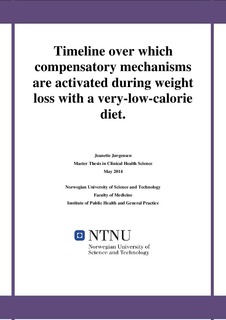| dc.description.abstract | Background: Diet-induced weight loss (WL) activates several compensatory mechanisms,
both at the level of energy intake (EI) and energy expenditure (EE), which increases the risk
of relapse. Unfortunately little is known regarding when these mechanisms are activated and
how they respond with progressive WL.
Purpose: To assess the timeline over which compensatory mechanisms are activated during
WL with a very-low-calorie diet (VLCD).
Material & methods: Twelve healthy obese men and women underwent an 8-week VLCD.
Body weight and composition, resting energy expenditure (REE), exercise efficiency (at 10,
25 and 50 W) and subjective feelings of appetite (in fasting and for 2.5 h after a meal) were
measured at baseline, day 3, after 1 week, when each individual participant lost 5 % and 10 %
of his/her baseline weight and at the end of the intervention.
Results: Significant WL was seen at day 3 and got stronger with progressive WL. REE was
significantly reduced at 5 % WL and remain stable until end of study. A significant increase
in exercise efficiency at 10 W was only seen at end of VLCD (average WL of 18.4±2.3 kg).
No significant changes in subjective feelings of appetite were observed, but there was a
tendency (P=0.058) for an increase in subjective feelings of hunger in fasting at day 3.
Conclusion: Losing weight with a VLCD (ketogenic diet) leads to a significant reduction in
REE from 5 % WL with no changes afterwards, while an increase in exercise efficiency at 10
W is only seen at the end of the intervention. Subjective feelings of appetite do not seem to
change significantly over time, even though a slight increase in fasting hunger may be seen at
day 3.
Relevance
The assessment of the timeline over which compensatory mechanisms, both at the level of EI
and EE, are activated with WL is extremely important to health professionals working within
obesity management. This knowledge will provide health professional with the understanding
of when compensatory mechanisms start to be activated and also, potentially, when a plateau
is reached. This information is very valuable since it can be used to try to help obese people to
lose weight and maintain it in the long term. | nb_NO |
